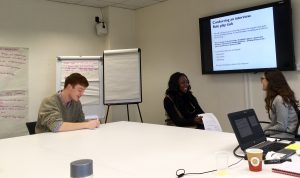By Katy Pickles
 My name is Katy Pickles and I’m currently part of the Young Persons Advisory Group (YPAG) for Imperial College London’s social media, other technologies and mental health research, which is focused on how young people might use social media whilst suffering with a mental health issue. Having used social media whilst in treatment for mental illness, I have found myself curious about the results of research such as this. I have been receiving information and helping shape the project for just over a month now and look forward to the next few months whilst I follow the progress that is made.
My name is Katy Pickles and I’m currently part of the Young Persons Advisory Group (YPAG) for Imperial College London’s social media, other technologies and mental health research, which is focused on how young people might use social media whilst suffering with a mental health issue. Having used social media whilst in treatment for mental illness, I have found myself curious about the results of research such as this. I have been receiving information and helping shape the project for just over a month now and look forward to the next few months whilst I follow the progress that is made.
To give you a little further insight into the research, it can be outlined as such: The acceptability of using wearables, social media and other technologies in helping to detect deteriorating (worsening) mental health in young adults.
Firstly, it is clear that Imperial College are looking into the detection of changes in mental health using wearables, social media and other technologies rather than the impact that these things may directly have on mental health. Initially, I had to get myself over this hurdle as recent media coverage has been heavily focused on the direct impact that social media has on its users rather than what these digital platforms are doing to detect user health. Secondly, Imperial College are clearly looking at a very broad spectrum of technology and only a small group of users (in this case – young people!). I have come to understand that in order to generate an achievable research topic, questions must allow potential for scope but also have a clear target to aim at.
Previously, I have been a member of a separate YPAG at The McPin Foundation where I met many likeminded young people to share my ideas about mental health with. I heard about Imperial’s research through my work with McPin and previous to this through my work with B-eat, the UK’s leading eating disorder charity.
Imperial College have already given roles to each of the young people who have shown a keen interest in becoming further involved in the research. Each role covers a different area of the research procedure such as data collection and analysis, interviewing and project management. I personally hope to play a larger part in the dissemination of findings as I’m a big talker! I am very keen on interacting with people on matters that are important to me. I think an important part of recovery from any mental illness is sharing in experiences. Therefore, becoming involved in research has not only been of immense interest to me but it’s also played a part in my recovery. As a result I have learnt how to use my vulnerabilities to help others – something which I could have only wished for coming out of my mental health battle!
I have enjoyed learning about how research is carried out around subjects that matter to me. Both mental health and social media impact is still a grey area – to witness research being carried out (and actually playing a part in the process) has been very rewarding. I have also learnt a lot about how research is developed and just how complicated it can be to deliver answers with accuracy.
I think it’s always difficult working with young people but it is also very difficult working with people who suffer from mental health issues. Although researchers I have worked with have been very forgiving of any gaps in productivity I still feel that the formalities of research imply that there is pressure for participants to continually contribute to forums, feedback sessions and discussions whether it is via email or face to face. This sense of pressure, coupled with a mental health issue, can be very challenging. I understand that formalities are important to help research progress but such formalities can sometimes feel impersonal and overwhelming. I would highly recommend that researchers conduct more face to face meetings where personal interaction is used to support those involved in research with no formal training. Meeting other young people who share such an interest for improving mental health research during face to face meetings has been hugely helpful and so more of this could only improve my experience!
I am proud to be playing an active role in research on young people’s mental health as I can only hope that the future of mental health will be transformed and better supported as a result. I would fully encourage others to get involved in research such as this, in order to gain a better understanding of research procedure and to develop new skills. Plus – research can really make a difference!
Please contact Anna a.lawrence-jones@imperial.ac.uk, if you would like more information about this project or how you could get involved in opportunities like this.